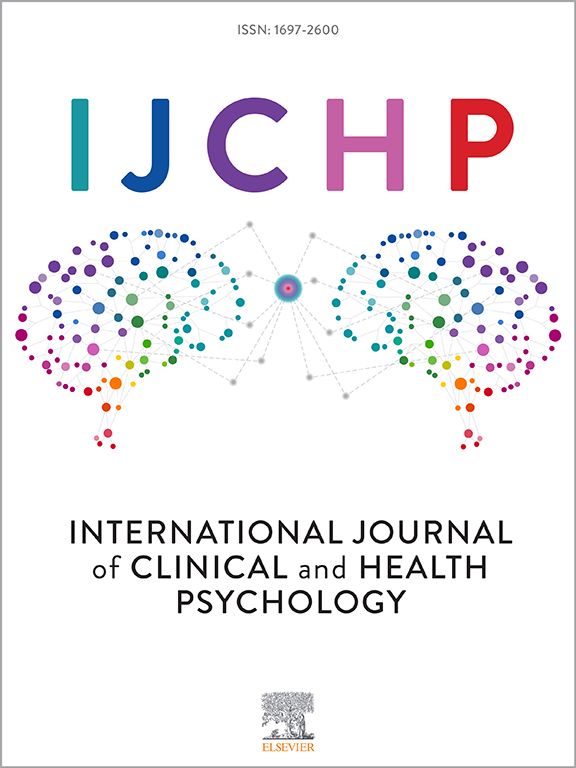Network structures of general, physical and psychological fatigue in patients with metastatic colorectal cancer: Implications for targeted coping strategies
IF 5.3
1区 心理学
Q1 PSYCHOLOGY, CLINICAL
International Journal of Clinical and Health Psychology
Pub Date : 2025-04-01
DOI:10.1016/j.ijchp.2025.100590
引用次数: 0
Abstract
Background
Cancer-related fatigue (CRF) is a prevalent and debilitating symptom experienced by many patients, affecting both their physical and psychological well-being. This study aims to explore the network organization of three dimensions of CRF (i.e., general, physical, and psychological) and to examine how patient’s resources such as coping strategies interact with these distinct aspects of fatigue.
Method
This study involves data from a previous observational study on patients with metastatic colorectal cancer undergoing chemotherapy. Participants (N = 169) completed several questionnaires at baseline. Partial correlation network analysis was used to model the relationships between patients’ symptoms (i.e., CRF, emotional distress) and resources (i.e., perceived control of the illness, coping strategies, perceived social support), in three distinct networks, each of them including one dimension of fatigue (i.e., general, physical, or psychological). In each network, a core variable (i.e., a symptom or a resource) was identified based on the highest centrality indices.
Results
Coping strategies emerged as the core variable in the three networks, while depression was the symptom with the strongest association with CRF. These findings underline the interconnection between emotional state and fatigue, but most of all suggest the centrality of the patients’ resources, specifically coping strategies used to manage their symptoms, and their potential role in influencing the symptoms.
Conclusion
Our findings are expected to provide insights into targeted therapeutic approaches and enhance patient care. Understanding the complex interplay between the dimensions of fatigue and the coping strategies employed by patients is crucial for developing effective interventions.
转移性结直肠癌患者一般、生理和心理疲劳的网络结构:对有针对性的应对策略的影响
癌症相关疲劳(CRF)是许多患者普遍经历的一种使人衰弱的症状,影响他们的身体和心理健康。本研究旨在探讨慢性疲劳综合症的三个维度(即一般、生理和心理)的网络组织,并研究患者的资源(如应对策略)如何与这些不同的疲劳方面相互作用。方法本研究纳入了先前对转移性结直肠癌化疗患者的观察性研究数据。参与者(N = 169)在基线完成了几份问卷调查。部分相关网络分析用于在三个不同的网络中对患者的症状(即慢性疲劳综合症、情绪困扰)和资源(即对疾病的感知控制、应对策略、感知社会支持)之间的关系进行建模,每个网络都包括一个维度的疲劳(即一般、身体或心理)。在每个网络中,根据最高中心性指数确定一个核心变量(即症状或资源)。结果范围策略是三个网络的核心变量,而抑郁是与CRF相关性最强的症状。这些发现强调了情绪状态和疲劳之间的联系,但最重要的是表明了患者资源的中心地位,特别是用于控制症状的应对策略,以及它们在影响症状方面的潜在作用。结论我们的研究结果有望为有针对性的治疗方法和提高患者的护理提供见解。了解疲劳维度和患者所采用的应对策略之间复杂的相互作用对于制定有效的干预措施至关重要。
本文章由计算机程序翻译,如有差异,请以英文原文为准。
求助全文
约1分钟内获得全文
求助全文
来源期刊

International Journal of Clinical and Health Psychology
PSYCHOLOGY, CLINICAL-
CiteScore
10.70
自引率
5.70%
发文量
38
审稿时长
33 days
期刊介绍:
The International Journal of Clinical and Health Psychology is dedicated to publishing manuscripts with a strong emphasis on both basic and applied research, encompassing experimental, clinical, and theoretical contributions that advance the fields of Clinical and Health Psychology. With a focus on four core domains—clinical psychology and psychotherapy, psychopathology, health psychology, and clinical neurosciences—the IJCHP seeks to provide a comprehensive platform for scholarly discourse and innovation. The journal accepts Original Articles (empirical studies) and Review Articles. Manuscripts submitted to IJCHP should be original and not previously published or under consideration elsewhere. All signing authors must unanimously agree on the submitted version of the manuscript. By submitting their work, authors agree to transfer their copyrights to the Journal for the duration of the editorial process.
 求助内容:
求助内容: 应助结果提醒方式:
应助结果提醒方式:


